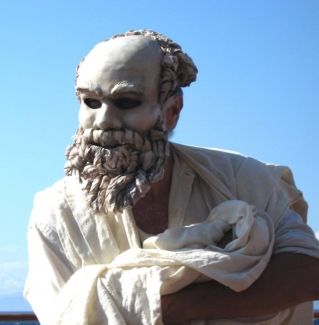Event

Plato's Apology is a literary and philosophical masterpiece. It offers a vivid portrait of Socrates and ariveting answer to the question at the heart of Greek philosophy: "How ought one to live?" What wefind in this text, in a nutshell, is this. At age 70, with a record as a combat veteran of the recentlyconcluded Peloponnesian War to his credit, and a decades-long history as an unconventional and sometimes unpopular thinker who openly questioned the deeply felt moral convictions of reputedly wise men and repeatedly scrutinized traditional definitions of "virtue" and “the good life," Socrates faces a jury of 500 Athenian citizens as the defendant in a capital case. The charges against him: religious nonconformity and corrupting the youth. The prosecution--the team of Meletus, Anytus and Lykon—aims to silence him once and for all. In their view, his dissenting activities are harming the youth and risk the security of the state. To them, the volatile instability of post-war Athens amounts to a crisis that makes this matter urgent. Socrates responds with remarkable calm. He greets the court case as an opportunity to give a full, public account of his life's work and its enduring importance. With wit and brilliance, as well as seemingly little regard for how the verdict and sentencing might actually turn out, he explains himself and defends his alternative moral views.
Yannis Simonides was born in Istanbul and raised in Athens. He is a Yale University trained actor/writer (BA /MFA) and Emmy-winning documentary producer. He has served as professor and chair of the NYU Tisch School of the Arts Drama Department, as executive producer of Greek Orthodox Telecommunications (GOTelecom) and as the executive director of Hellenic Public Radio in New York. He is the founder and director of Elliniko Theatro (Greek Theater of New York and Greek Theatre International) celebrating this year 35 years of continuous international work. His performance work includes plays by Aeschylus, Euripides, Sophocles, Aristophanes, Shakespeare, Brecht, Kazantzakis, Kambanellis and others, along with solo and ensemble pieces culled from the writings of Cavafy, Makriyannis, and Nikolai Gogol. He is the recipient of an Emmy award for his documentary A Light Still Bright on the Greek community of Istanbul, and he recently constructed and directed Smyrne, a docudrama on the post WWI military and political upheavals in Southeastern Europe and Middle East and the disastrous exchange of populations. He has performed the Apology of Socrates in 17 countries and is scheduled to take it on tour in the U.S., Russia, China, South Africa, the UK and Turkey through 2016. As a founding member of the international literary organization The Readers of Homer, he has co-produced marathon audience-participation Readings-Celebrations of the Iliad and Odyssey on the islands of Chios and Kos in Greece, at the Library of Alexandria, the Dahesh Museum and the 92nd Street Y in New York, the University of the Republic in Montevideo, Uruguay, in Troy, Delos, Pylos, Malta, Sicily and Ithaca, at the Getty Villa in Malibu, at the Halles de Schaerbeek in Brussels at the Hellenic Centre in London, and the Portland Art Museum in Oregon. In 2009 he was honored by the City of Athens as Ambassador of Hellenism for his lifelong service to Greek arts and letters worldwide. In 2010, along with a team of young visionaries, he founded Greek Theatre International, with the express mission not only to help expand the boundaries of Hellenic theatre, but to contribute decisively in Greece’s upcoming renaissance, serving cultural diplomacy in practice.
